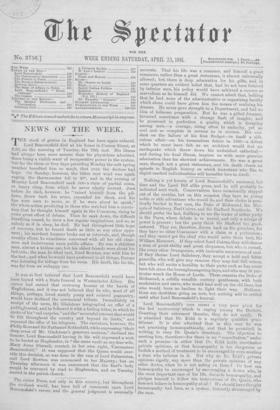Lord Beaconsfield's case seems a very poor pivot for the
hot controversy which is raging among the Doctors. Granting their ertremest theories, they do not apply. It is admitted that Dr. Kidd is a regularly qualified prac- titioner. It is also admitted that in this case he was not practising hornceopathically, and that he promised, in writing, to obey Dr. Quain's directions. The objection to meeting him, therefore—for there is no "consultation," under such a promise—is either that Dr. Kidd holds unorthodox private opinions, or that homoeopathy is too dangerous or foolish a method. of treatment to be encouraged by even meeting a man who believes in it. But why do Dr. Kidd's private opinions signify, any more than the private opinions of any other doctor, whim he is not acting on them ? Or how can homoeopathy be encouraged by encouraging a doctor who, in the most important case of his life, discards hoinceopathy, and pledges himself to follow the instructions of Dr. QuItiu, who does not believe in homoeopathy at all ? We should have thought homceopathy had been, as a system, distinctly discouraged by the case.


































